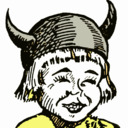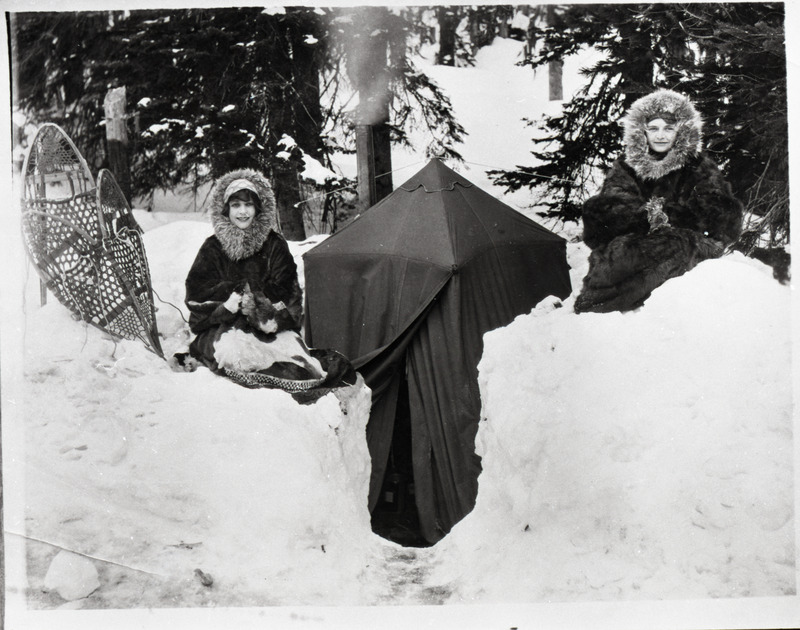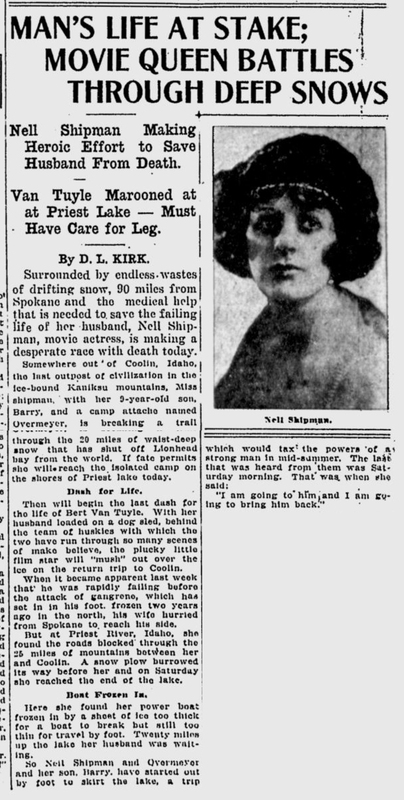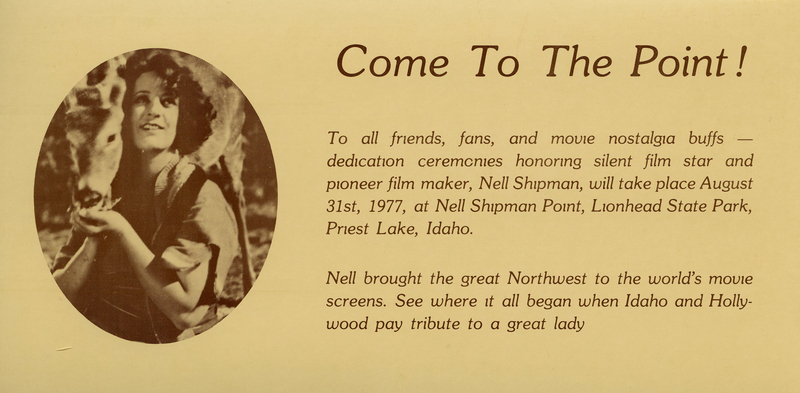One of the many characters who inhabit the collections found at the U of I Library’s Special Collections and Archives is writer, film producer, and actor Nell Shipman. She started her production company, Nell Shipman Productions, in California to make her own way in the film industry and eventually moved the company to Priest Lake, drawn by her love of the country there.
At her lakeside studio Lionshead Lodge she filmed The Grub Stake which was planned to recover debts from her previous film The Girl From God’s Country. Shipman reflected in her autobiography the expectations that hung on the film: “So it came about that this picture was a real ‘grub-stake’ gamble–burro, pack, grub, pick, shovel, and gold pan, for a prospector who must strike it, must pan out (Silent Screen).”
She lived a vivacious life from the moment she was mistaken for a stillborn in 1892. Her grieving mother had carried her body outside to a nearby cliff where Nell started breathing.
“Perhaps life was re-born by the sea-breeze from the Straits, the wind from snow mountains seasoned by pine and fir and by woodlands of bracken and fern, by the kelp beds drifting on the channel waters over which it swung its strong wings and gathered itself the aromatic, heady, vital smell which is Mare Nostrum. And the heather. And the broom, the yellow-starred sweet broom! A hill of it lifted its gentle ambrosia and added it to the cup it lifted to the lips of the little, new, un-alive Canadienne. Surely she sipped the magic mixture and revived! A draught of such air is life. Or, and this is my secret, never-before-mentioned theory, I might be a changeling.” –Nell Shipman, Silent Screen
Many of her adventures could be mistaken for the cliff hangers she performed in. She joined a U.S. touring company at the age of 13 and married 5 years later. In her own accounting by 1915, she was in California shooting films, writing, directing, and turned down a 6-year contract with Goldwyn Studios that would have guaranteed her stardom. During that same year she starred in God’s Country and the Woman, a role she would remain connected with. This was the big break she had been looking for in acting and led to her fame in silent films (Armatage). Director Rollin Sturgeon “hired me, not because I could act, in fact he loathed all stage performers, but I was the type: athletic, a swimmer, someone who could get around the wilderness without stubbing her toe on a pinecone” (Shipman).
In 1921 she formed her own production company, Nell Shipman Productions, and created her own films. After an initial start in California, she relocated to the wilderness of Priest River. With her lover-director and a menagerie of over 100 animals, she created a miniature film community making Canadian north themed films (Trusky, Butler).
The log cabin that would be Lionhead Lodge was 21 miles from a road, 50 from the train. They would dogsled a frozen lake in the winter to leave the studio camp. On foot it was a two-day walk out (Armatage).
During the cabin’s construction they lived in a house boat: Picture a mean little 6x12 floating shack of unpainted boards, with a door at each end and two tiny windows in each side. From the tin-patched roof of homemade shingles … protrudes a crooked cat’s tail of rusty stovepipe. This connects, inside, with a greasy black demon with a fat belly and fallen arches–the cookstove….All this is moored to a curved beach of astonishing beauty, backed by an emerald wall that slopes up and up, away and away to Canada and God knows where –Nell Shipman (Atlantic).
Shipman was also involved in the region. She would show her films in Spokane to raise funds to get to New York to find a distributor. Crews here hired to build Lionshead and the zoo she needed for all the performing animals. Workers were also involved in production and performance.
Dorothy Wilson was hired to work on screen with Shipman and the actor left an impression:
Nell was a very strong minded person. At first I felt she was a little hard to get acquainted with. Once we got to know each other she was very warm and friendly. She and I got along exceptionally well. She was a topflight woman in every respect. I must admit she held the whip hand. She ran the place. She knew a lot more about picture taking than her director, Bert Van Tuyle. –Dorthy Winslow Overmyer, MG 115-1-32
The film company struggled and her director Van Tuyle got frostbite and had to be evacuated. It was an adventure that made front page of the Spokane Daily Chronicle and several other newspapers which referred to him as her “husband.”
In the end, she was forced to abandon Lionshead four years after its creation and shift her attention to acting and screenwriting.
After her passing in 1970, Canada dubbed her “The First Lady of Canadian Cinema.” And in 1977, the state of Idaho renamed the site of Lionhead Lodge to Nell Shipman Point (MG 115).
Special Collections and Archives has books in the Day-NW collection about Shipman–including her autobiography as well as the Claude and Catherine Simpson Papers which contain book research for Priest Lake, North of the Narrows: Men and Women of the Upper Priest Lake Country, Idaho.
The main library has Nell Shipman’s collected films in its video library available for check out. Patrons are invited to come explore the many stories to be found in the University of Idaho Library.
Resources
Armatage, Kay. “Nell Shipman: A Case of Heroic Femininity”. Gendering the Nation: Canadian Women’s Cinema, edited by Kay Armatage, Kass Banning and Brenda Longfellow, Toronto: University of Toronto Press, 1999.
Bragg, L., & Bragg, L. E. (2016). Idaho’s remarkable women: Daughters, wives, sisters, and mothers who shaped history. Day Northwest (Day-NW) Book Collection.
Idaho Subject Vertical File, 1880-current.
MG 115 Claude and Catherine Simpson Papers, circa 1900-1988.
Nell Shipman collection UI Library Video (2nd floor DVD collection), 1919.
Priest Lake Historical Photograph Collection.
Shipman, Nell, “The Movie that Couldn’t be Screened,” Atlantic Monthly, March 1925.
Shipman, Nell and Tom Trusky. The Silent Screen & My Talking Heart : An Autobiography. 1st ed., Boise State University, 1987. Day Northwest (Day-NW) Book Collection.
Trusky, Tom. “Nell Shipman.” In Jane Gaines, Radha Vatsal, and Monica Dall’Asta, eds. Women Film Pioneers Project. New York, NY: Columbia University Libraries, 2013.





